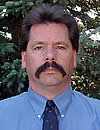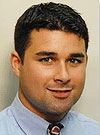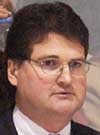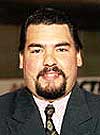Four, not three, bidding committees came away happy when the NCAA Ice Hockey Committee announced the awarding of Frozen Four bids.
Washington, D.C., Detroit, St. Paul and Tampa all came away happy, as they were awarded the Frozen Fours between 2009-2012.
Washington, D.C., is hosting its first Frozen Four, and got it on its first attempt.
“The city of Washington, D.C. just provided a great backdrop to our tournament,” said Wayne Dean, chair of the committee. “The city itself is just in tune with what we’re trying to do. Naming the national champion in the national capital is fantastic.”
Detroit will host for the first time since 1990, and it held the uniqueness of Ford Field. Ford Field, in the end, was a factor in the positive.
“When we walked into Ford Field it had a great feel and it felt like a large arena,” said Dean. “We looked at sightlines and went down to the field and felt like it was a great place to play hockey. We walked away thinking that this was not an experiment and this was the real thing. We felt it was a great experience for the student-athlete and the fan.”
St. Paul was considered a lock to get one of the Frozen Four and the committee saw no different.
“The building is fantastic, the city of St. Paul is an unbelievable place to go and [nl]Minnesota is a great host, you put that together, you can’t beat it,” said Dean. “That’s why we’re going back there.”
Tampa also was a first-time bidder.
“With the Stanley Cup residing in Tampa, hockey is booming,” said Dean. “With all the things together, we felt it was a very viable college hockey venue. The quality of the ice, the climate-control in the building is second-to-none. And any time you can bring the student-athletes and fans to a place where they can do many things, it’s great. They have beaches and warm weather and it all factors in.
“And we can do all of that without detracting from the Frozen Four.”
The committee was supposed to award through 2011, but instead added a fourth site in 2012 due to the quality of the bids. The last time that the committee did this was when Buffalo was awarded the 2003 Frozen Four in addition to the committee selecting [nl]Providence (2000), Albany (2001) and St. Paul (2002).
“We knew after we got the initial bids that it was a possibility,” said Dean about going to 2012. “When you have that many good sites, and we had six quality sites, we discussed going to six, but the quality of the sites really made it an easy decision to go one more year.”
The addition of the 2012 Frozen Four was not the only surprise, the other was that Boston, thought to be a lock by others, did not receive the Frozen Four. Philadelphia was the other finalist not to receive a Frozen Four.
“Timing was certainly an issue with Boston,” said Dean. “Boston just hosted in 2004, they will be in the queue. They’re a great hockey town and have shown that they can do it.
“When we looked at Philadelphia, we were able to go down and see the area, and the plans around the arena and the atmosphere, and the history was great. They were in the mix that was competitive. In the queue, I will say that they’ll be in the mix.”
“We seriously thought about adding six years,” said Jacobs. “I do hope Philadelphia comes back because it was a great bid.”
Regionals were also awarded by the committee. The East and Northeast regionals were awarded until 2011 and the West and Midwest until 2009.
Four sites will rotate regionals between 2008 and 2011. In 2008 and 2010 the East Regional will be at the Pepsi Arena in Albany, N.Y. and the Northeast Regional will be at the Centrum Centre in Worcester, Mass. In 2009 and 2011 the East Regional will be held at The Arena At Harbor Yard in Bridgeport, Conn. and the Northeast Regional will be at the Verizon Wireless Arena in Manchester, N.H. Albany and Worcester are perennial hosts, Manchester will host it a second and third time, while Bridgeport will be holding its first two regionals.
These four venues were the only four sites that submitted bids for regionals in the East.
In the West, regionals were only awarded through 2009. In 2008 the Midwest Regional will be at the Kohl Center in Madison, Wis. and the West Regional at the Colorado Springs World Arena. In 2009 the West Regional will be at the Mariucci Arena in Minneapolis while the Midwest Regional will be at Grand Rapids, Mich.’s Van Andel Arena. Three of the four regional sites awarded in the West are campus sites.
“It is clear that neutral-site venues are an issue,” said Dean. “Right now our committee has a strong preference to do that. That was the main idea in that decision to only go to 2009.”
“We had nine bids for regionals in the West, but the preference was to go to neutral-site venues,” said Tom Jacobs, NCAA Director of Championships.
The Frozen Four bidding process started with 13 bids. The bids from Albany, Buffalo, Columbus, Glendale, Ariz., Kansas City, San Antonio and Sunrise, Fla. did not make it to the list of finalists.
Future Frozen Four Sites
New selections from this announcement in bold.
2006
East Regional — Pepsi Arena (Albany, N.Y., March 25-26)
Northeast Regional — DCU Center (Worcester, Mass., March 24-25)
Midwest Regional — Resch Center (Green Bay, Wis., March 25-26)
West Regional — Engelstad Arena (Grand Forks, N.D., March 24-25)
Frozen Four — Bradley Center (Milwaukee, April 6 and 8)
2007
East Regional — Blue Cross Arena (Rochester, N.Y., March 23-24)
Northeast Regional — Verizon Wireless Arena (Manchester, N.H., March 24-25)
Midwest Regional — Van Andel Arena (Grand Rapids, Mich., March 23-24)
West Regional — Pepsi Center ([nl]Denver, March 24-25)
Frozen Four — Savvis Center (St. Louis, April 5 and 7)
2008
East Regional — Pepsi Arena (Albany, N.Y., March 28-30)
Northeast Regional — DCU Center (Worcester, Mass., March 28-30)
Midwest Regional — Kohl Center (Madison, Wis., March 28-30)
West Regional — Colorado Springs World Arena (Colorado Springs, Colo., March 28-30)
Frozen Four — Pepsi Center (Denver, April 10 and 12)
2009
East Regional — Arena at Harbor Yard (Bridgeport, Conn., March 27-29)
Northeast Regional — Verizon Wireless Arena (Manchester, N.H., March 27-29)
Midwest Regional — Van Andel Arena (Grand Rapids, Mich., March 27-29)
West Regional — Mariucci Arena (Minneapolis, March 27-29)
Frozen Four — MCI Center (Washington, D.C., April 9 and 11)
2010
East Regional — Pepsi Arena (Albany, N.Y., March 26-28)
Northeast Regional — DCU Center (Worcester, Mass., March 26-28)
Midwest Regional — TBA (March 26-28)
West Regional — TBA (March 26-28)
Frozen Four — Ford Field (Detroit, April 8 and 10)
2011
East Regional — Arena at Harbor Yard (Bridgeport, Conn., March 25-27)
Northeast Regional — Verizon Wireless Arena (Manchester, N.H., March 25-27)
Midwest Regional — TBA (March 25-27)
West Regional — TBA (March 25-27)
Frozen Four — Xcel Energy Center (St. Paul, April 7 and 9)
2012
East Regional — TBA (March 23-25)
Northeast Regional — TBA (March 23-25)
Midwest Regional — TBA (March 23-25)
West Regional — TBA (March 23-25)
Frozen Four — St. Pete Times Forum (Tampa, April 5 and 7)
[Continue to check back with USCHO for more information.]



